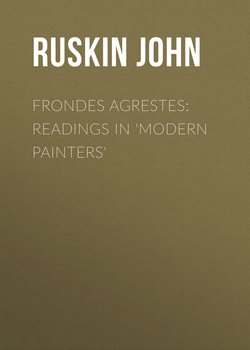Frondes Agrestes: Readings in 'Modern Painters'

Реклама. ООО «ЛитРес», ИНН: 7719571260.
Оглавление
Ruskin John. Frondes Agrestes: Readings in 'Modern Painters'
PREFACE
SECTION I. PRINCIPLES OF ART
SECTION II. POWER AND OFFICE OF IMAGINATION
SECTION III. ILLUSTRATIVE: THE SKY
SECTION IV. ILLUSTRATIVE: STREAMS AND SEA
SECTION V. ILLUSTRATIVE: MOUNTAINS
SECTION VI. ILLUSTRATIVE: STONES
SECTION VII. ILLUSTRATIVE: PLANTS AND FLOWERS
SECTION VIII. EDUCATION
SECTION IX. MORALITIES
Отрывок из книги
1. Perfect taste is the faculty of receiving the greatest possible pleasure from those material sources which are attractive to our moral nature in its purity and perfection; but why we receive pleasure from some forms and colours, and not from others, is no more to be asked or answered than why we like sugar and dislike wormwood.
2. The temper by which right taste is formed is characteristically patient. It dwells upon what is submitted to it. It does not trample upon it,—lest it should be pearls, even though it look like husks. It is good ground, penetrable, retentive; it does not send up thorns of unkind thoughts, to choke the weak seed; it is hungry and thirsty too, and drinks all the dew that falls on it. It is an honest and good heart, that shows no too ready springing before the sun be up, but fails not afterwards; it is distrustful of itself, so as to be ready to believe and to try all things; and yet so trustful of itself, that it will neither quit what it has tried, nor take anything without trying. And the pleasure which it has in things that it finds true and good, is so great, that it cannot possibly be led aside by any tricks of fashion, or diseases of vanity; it cannot be cramped in its conclusions by partialities and hypocrisies; its visions and its delights are too penetrating,—too living,—for any whitewashed object or shallow fountain long to endure or supply. It clasps all that it loves so hard that it crushes it if it be hollow.
.....
8. All the histories of the Bible are yet waiting to be painted. Moses has never been painted; Elijah never; David never (except as a mere ruddy stripling); Deborah never; Gideon never; Isaiah never.5 What single example does the reader remember of painting which suggested so much as the faintest shadow of their deeds? Strong men in armour, or aged men with flowing beards, he may remember, who, when he looked at his Louvre or Uffizi catalogue, he found were intended to stand for David, or Moses. But does he suppose that, if these pictures had suggested to him the feeblest image of the presence of such men, he would have passed on, as he assuredly did, to the next picture, representing, doubtless, Diana and Actæon, or Cupid and the Graces, or a gambling quarrel in a pothouse—with no sense of pain or surprise? Let him meditate over the matter, and he will find ultimately that what I say is true, and that religious art at once complete and sincere never yet has existed.
15. In the highest poetry, there is no word so familiar, but a great man will "bring good out of it, or rather, it will bring good to him, and answer some end for which no other word would have done equally well. A common person, for instance, would be mightily puzzled to apply the word 'whelp' to anyone, with a view of flattering him. There is a certain freshness and energy in the term, which gives it agreeableness, but it seems difficult, at first hearing it, to use it complimentarily. If the person spoken of be a prince, the difficulty seems increased; and when farther he is at one and the same moment to be called a 'whelp' and contemplated as a hero, it seems that a common idealist might well be brought to a pause! But hear Shakespeare do it:—
.....